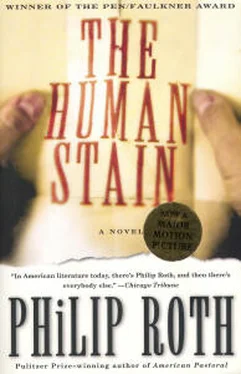In the Roberts years all the bright younger people he recruited loved Coleman because of the room he was making for them and because of the good people he began hiring out of graduate programs at Johns Hopkins and Yale and Cornell—“the revolution of quality,” as they themselves liked to describe it. They prized him for taking the ruling elite out of their little club and threatening their self-presentation, which never fails to drive a pompous professor crazy. All the older guys who were the weakest part of the faculty had survived on the ways that they thought of themselves — the greatest scholar of the year 100 b.c., and so forth — and once those were challenged from above, their confidence eroded and, in a matter of a few years, they had nearly all disappeared. Heady times! But after Pierce Roberts moved on to the big job at Michigan, and Haines, the new president, came in with no particular loyalty to Coleman — and, unlike his predecessor, exhibiting no special tolerance for the brand of bulldozing vanity and autocratic ego that had cleaned the place out in so brief a period — and as the young people Coleman had kept on as well as those he'd recruited began to become the veteran faculty, a reaction against Dean Silk started to set in. How strong it was he had never entirely realized until he counted all the people, department by department, who seemed to be not at all displeased that the word the old dean had chosen to characterize his two seemingly nonexistent students was definable not only by the primary dictionary meaning that he maintained was obviously the one he'd intended but by the pejorative racial meaning that had sent his two black students to lodge their complaint.
I remember clearly that April day two years back when Iris Silk died and the insanity took hold of Coleman. Other than to offer a nod to one or the other of them whenever our paths crossed down at the general store or the post office, I had not really known the Silks or anything much about them before then. I hadn't even known that Coleman had grown up some four or five miles away from me in the tiny Essex County town of East Orange, New Jersey, and that, as a 1944 graduate of East Orange High, he had been some six years ahead of me in my neighboring Newark school. Coleman had made no effort to get to know me, nor had I left New York and moved into a two-room cabin set way back in a field on a rural road high in the Berkshires to meet new people or to join a new community. The invitations I received during my first months out here in 1993 — to come to a dinner, to tea, to a cocktail party, to trek to the college down in the valley to deliver a public lecture or, if I preferred, to talk informally to a literature class — I politely declined, and after that both the neighbors and the college let me be to live and do my work on my own.
But then, on that afternoon two years back, having driven directly from making arrangements for Iris's burial, Coleman was at the side of my house, banging on the door and asking to be let in. Though he had something urgent to ask, he couldn't stay seated for more than thirty seconds to clarify what it was. He got up, sat down, got up again, roamed round and round my workroom, speaking loudly and in a rush, even menacingly shaking a fist in the air when — erroneously — he believed emphasis was needed. I had to write something for him — he all but ordered me to. If he wrote the story in all of its absurdity, altering nothing, nobody would believe it, nobody would take it seriously, people would say it was a ludicrous lie, a self-serving exaggeration, they would say that more than his having uttered the word “spooks” in a classroom had to lie behind his downfall. But if I wrote it, if a professional writer wrote it...
All the restraint had collapsed within him, and so watching him, listening to him — a man I did not know, but clearly someone accomplished and of consequence now completely unhinged — was like being present at a bad highway accident or a fire or a frightening explosion, at a public disaster that mesmerizes as much by its improbability as by its grotesqueness. The way he careened around the room made me think of those familiar chickens that keep on going after having been beheaded. His head had been lopped off, the head encasing the educated brain of the once unassailable faculty dean and classics professor, and what I was witnessing was the amputated rest of him spinning out of control.
I — whose house he had never before entered, whose very voice he had barely heard before — had to put aside whatever else I might be doing and write about how his enemies at Athena, in striking out at him, had instead felled her. Creating their false image of him, calling him everything that he wasn't and could never be, they had not merely misrepresented a professional career conducted with the utmost seriousness and dedication — they had killed his wife of over forty years. Killed her as if they'd taken aim and fired a bullet into her heart. I had to write about this “absurdity,” that “absurdity”—I, who then knew nothing about his woes at the college and could not even begin to follow the chronology of the horror that, for five months now, had engulfed him and the late Iris Silk: the punishing immersion in meetings, hearings, and interviews, the documents and letters submitted to college officials, to faculty committees, to a pro bono black lawyer representing the two students ... the charges, denials, and countercharges, the obtuseness, ignorance, and cynicism, the gross and deliberate misinterpretations, the laborious, repetitious explanations, the prosecutorial questions — and always, perpetually, the pervasive sense of unreality. “Her murder!” Coleman cried, leaning across my desk and hammering on it with his fist. “These people murdered Iris!”
The face he showed me, the face he placed no more than a foot from my own, was by now dented and lopsided and — for the face of a well-groomed, youthfully handsome older man — strangely repellent, more than likely distorted from the toxic effect of all the emotion coursing through him. It was, up close, bruised and ruined like a piece of fruit that's been knocked from its stall in the marketplace and kicked to and fro along the ground by the passing shoppers.
There is something fascinating about what moral suffering can do to someone who is in no obvious way a weak or feeble person. It's more insidious even than what physical illness can do, because there is no morphine drip or spinal block or radical surgery to alleviate it. Once you're in its grip, it's as though it will have to kill you for you to be free of it. Its raw realism is like nothing else.
Murdered. For Coleman that alone explained how, out of nowhere, the end could have come to an energetic sixty-four-year-old woman of commanding presence and in perfect health, an abstract painter whose canvases dominated the local art shows and who herself autocratically administered the town artists' association, a poet published in the county newspaper, in her day the college's leading politically active opponent of bomb shelters, of strontium 90, eventually of the Vietnam War, opinionated, unyielding, impolitic, an imperious whirlwind of a woman recognizable a hundred yards away by her great tangled wreath of wiry white hair; so strong a person, apparently, that despite his own formidableness, the dean who reputedly could steamroll anybody, the dean who had done the academically impossible by bringing deliverance to Athena College, could best his own wife at nothing other than tennis.
Once Coleman had come under attack, however — once the racist charge had been taken up for investigation, not only by the new dean of faculty but by the college's small black student organization and by a black activist group from Pittsfield — the outright madness of it blotted out the million difficulties of the Silks' marriage, and that same imperiousness that had for four decades clashed with his own obstinate autonomy and resulted in the unending friction of their lives, Iris placed at the disposal of her husband's cause. Though for years they had not slept in the same bed or been able to endure very much of the other's conversation — or of the other's friends — the Silks were side by side again, waving their fists in the faces of people they hated more profoundly than, in their most insufferable moments, they could manage to hate each other. All they'd had in common as comradely lovers forty years earlier in Greenwich Village — when he was at NYU finishing up his Ph.D. and Iris was an escapee fresh from two nutty anarchist parents in Passaic and modeling for life drawing classes at the Art Students League, armed already with her thicket of important hair, big-featured and voluptuous, already then a theatrical-looking high priestess in folkloric jewelry, the biblical high priestess from before the time of the synagogue — all they'd had in common in those Village days (except for the erotic passion) once again broke wildly out into the open ... until the morning when she awakened with a ferocious headache and no feeling in one of her arms. Coleman rushed her to the hospital, but by the next day she was dead.
Читать дальше












